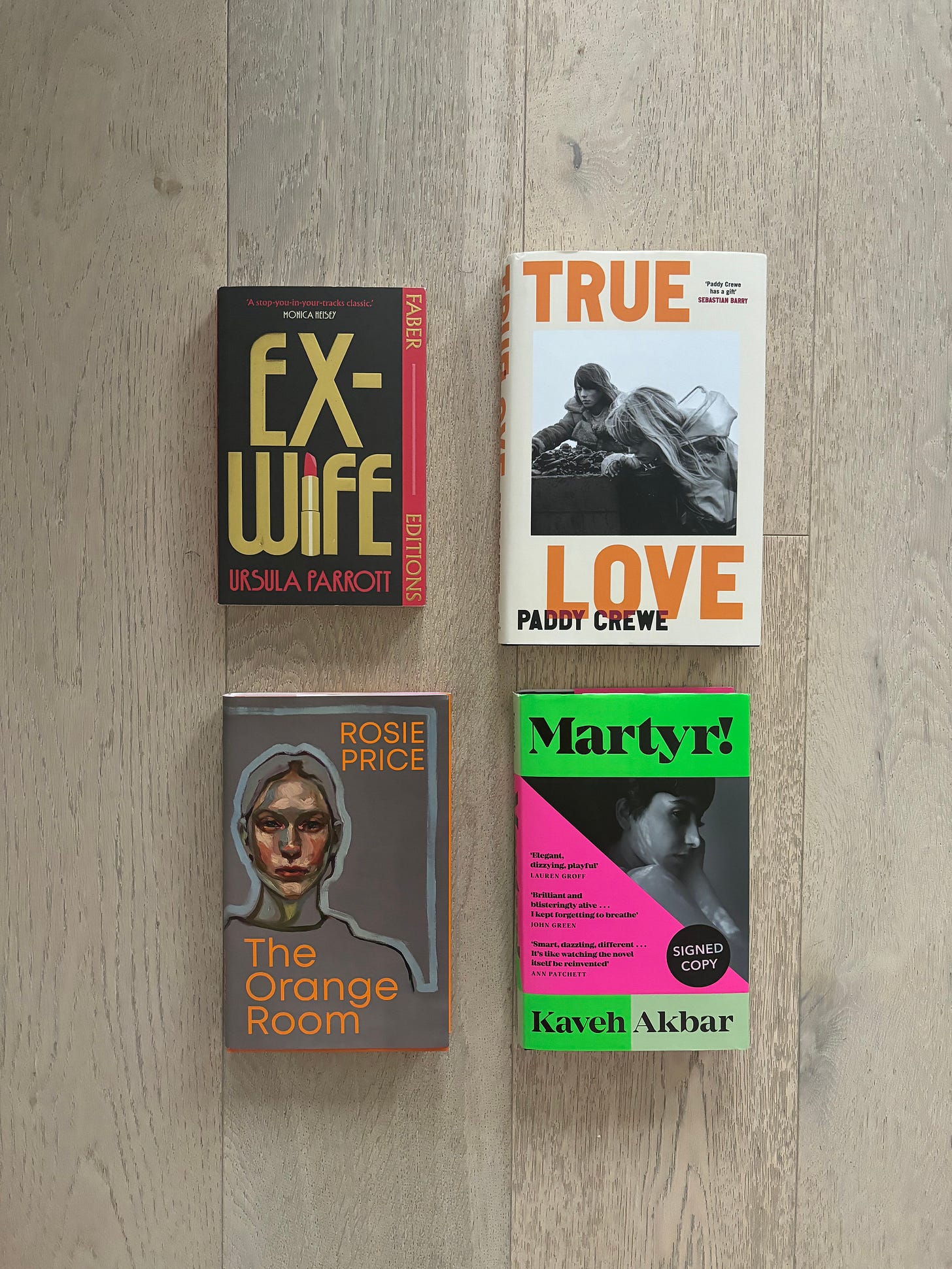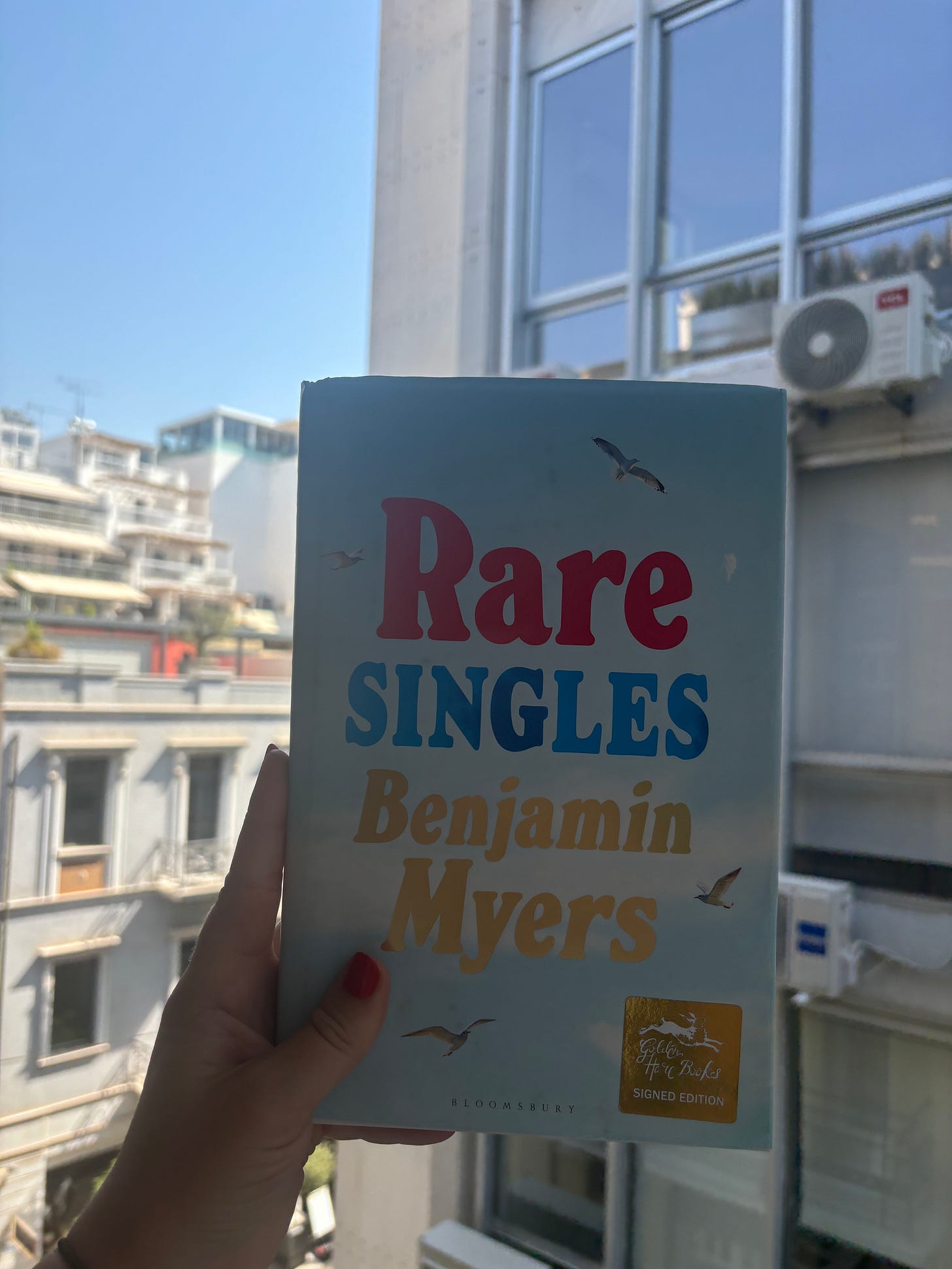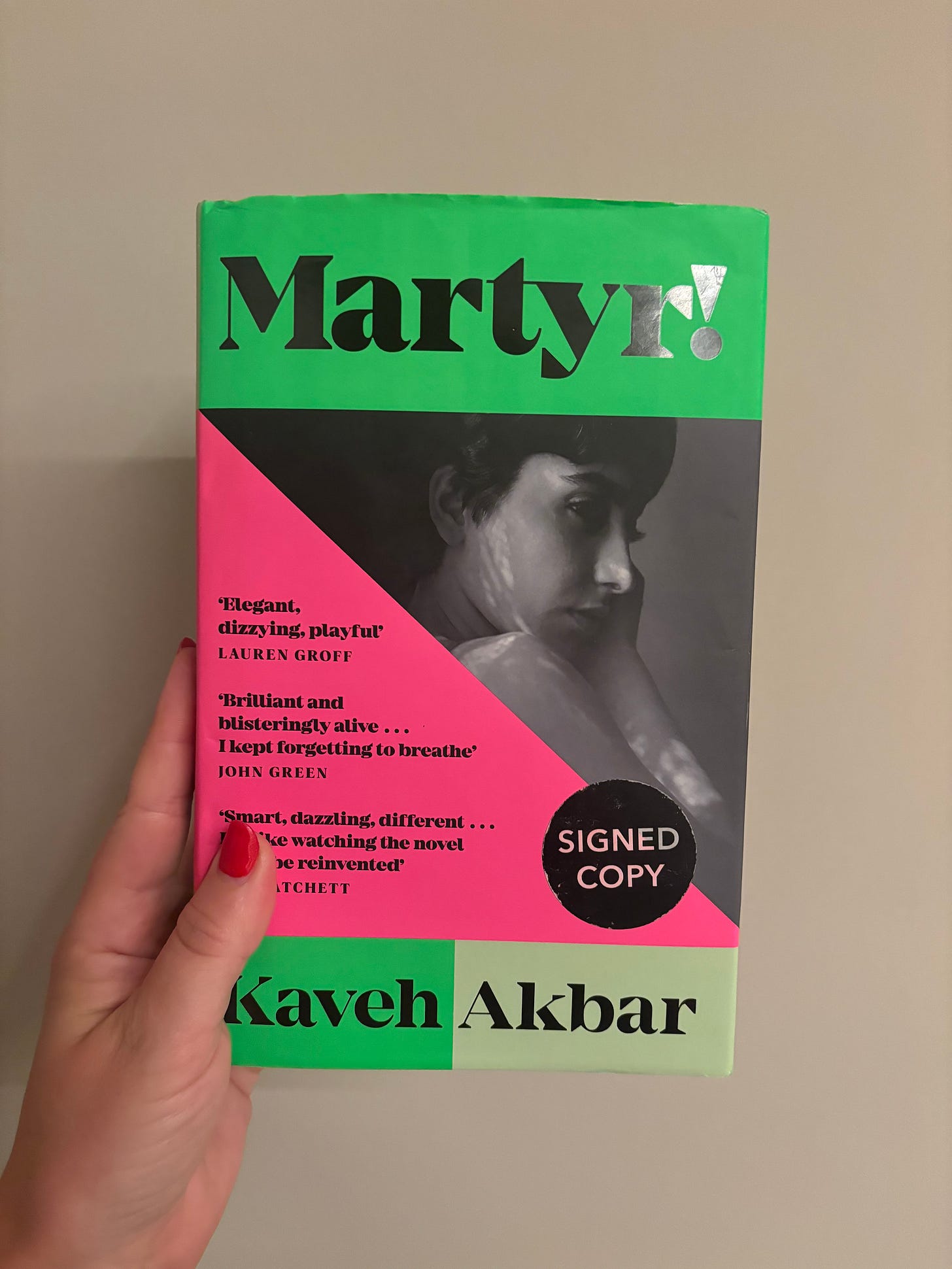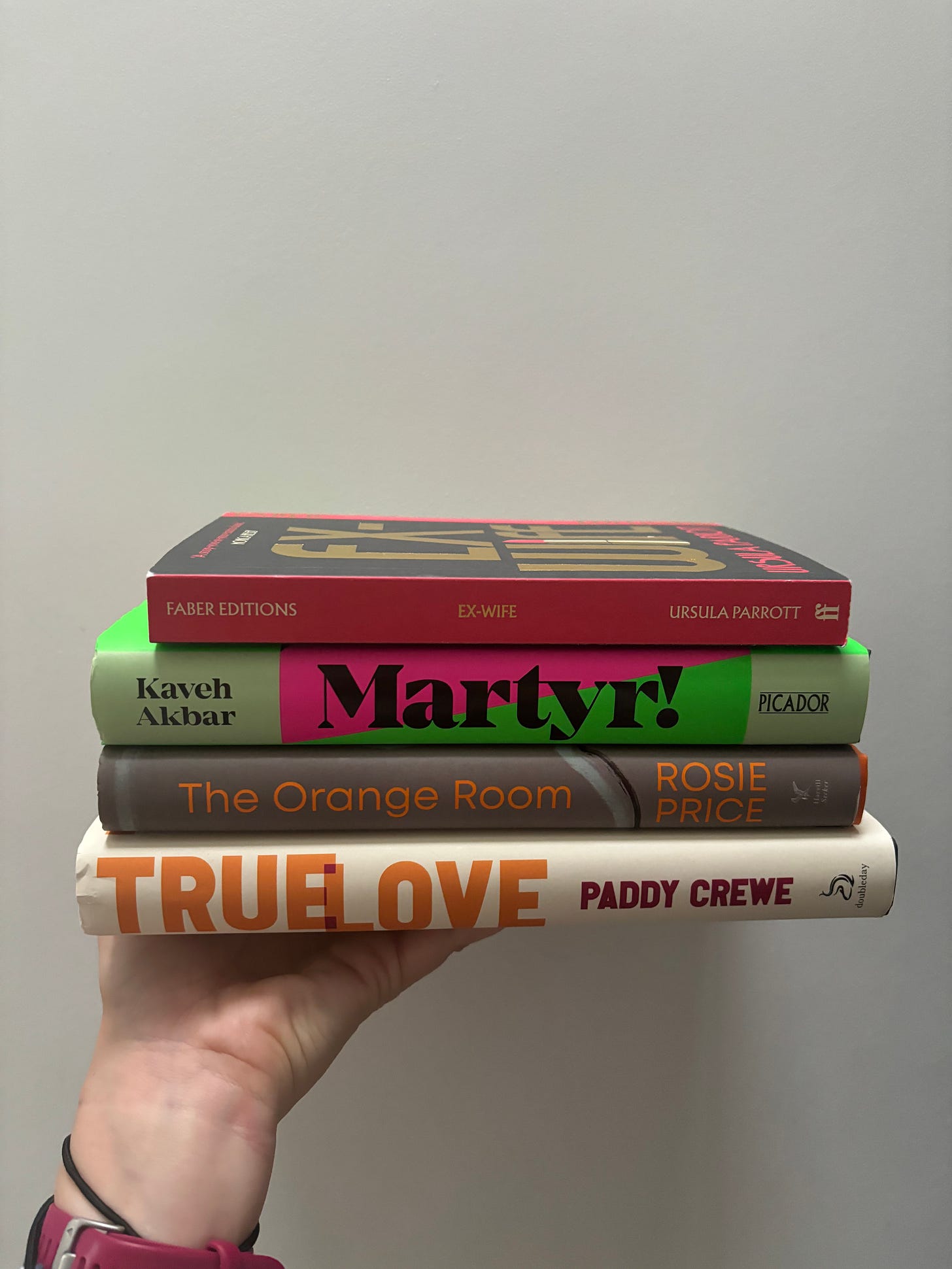I recently got back from the beautiful Greek island of Sifnos. After a night in Athens, we spent six days exploring the Cycladic island’s famous culinary scene, ancient walking trails and quaint beaches. I couldn’t recommend Sifnos more: often overlooked in favour of the nearby tourist traps of Mykonos and Santorini, it’s much quieter in comparison but there’s still a lot to do. This meant that I didn’t quite manage to read as much as I’d hoped to — I actually only read one full book while on the island, and the other two were largely read while travelling —, but I guess that’s the sign of a fun holiday!
Sifnos is also renowned for it’s beautiful pottery, so I made the last minute decision to remove a couple of books from my suitcase to save room for some ceramics on the way back. I’m pretty pleased with that choice as I only read the three hardbacks I’d packed in the end (and had no need for my Kindle), although I’m keen to get to the remaining two in the next few weeks.
The three novels I read were stylistically and tonally quite different, but they had some things in common. They all deal with grief (of a sibling, partner, parent) and explore the use of art to overcome pain. Two of the books feature female painters who learn to process their grief through their art (both covering bedroom walls with their paintings) and two of the books are about artists who stop creating their work after trauma, and the journey to rediscovering themselves and their passion. Two of them are about mourning a mother who died when the protagonist was young, two of them explore addiction and all three novels dealt with depression and mental illness in very different ways. (So I’ll caveat this post with a warning to bear this in mind if you find these themes difficult, especially Martyr!, which extensively explores addiction and suicidal ideation.)
I started with the shortest of the three, Rare Singles by Benjamin Myers, which I recently mentioned in my August publications round up. I really loved this sweet novel which tells the story of a forgotten soul singer who makes his first trip out of America to perform at a music festival in Scarborough. The contrast between this lumbering old American and the run-down coastal town was well drawn, both comical and poignant, from the ugly seagull which torments the protagonist, Bucky at night to an amusing scene where he teaches some local teenagers how to win the boxing game at the funfair.
On the first anniversary of Bucky’s wife death, he finds himself in Scarborough in the care of Dinah, a middle-aged woman with an alcoholic husband and an antisocial son who is perplexingly but inspiringly cheerful and compassionate despite her unexciting life. She is a huge fan of Bucky, whose hit song ‘Til The Wheels Come Off’ gives her hope when she’s sad; yet Bucky has no idea that he’s so famous in Europe. It’s a beautiful, heartwarming story about music, art and friendship, which I’d recommend to all readers, from parents to friends and lovers. It would also be a great one to give as a gift - while it touches on serious themes and intense suffering, this is ultimately a hopeful, uplifting book, and it’s definitely the lightest of the three. I read most of it on the plane and stayed up late on my first night to finish it, so I’d also recommend this for your next holiday. Five stars from me!
The second book I read was The Orange Room by Rosie Price. Rosie’s debut, What Red Was was published in 2018 and I’d been looking forward to reading her second novel since it was published in July. The debut is about sexual assault at university, and this one explores similar themes, opening with the protagonist abandoning her art degree after an incident with her professor. However, this assault is just the starting point for The Orange Room, which thoughtfully weaves together a range of difficult experiences in the three dimensional and empathetic protagonist, Rhianne: grief, trauma, abuse, depression.
I thought this was a sensitive and measured study of coercive control and manipulation, from the perspectives of both the abuser and the victim. It shows the various characters’ past wounds and insecurities without judgement or moralising: the individuals are all messy, damaged and mostly trying to do the right thing. I had a few conversations on holiday about morality and goodness, and this was a really nice accompaniment to these discussions. That said, I found it quite slow to read, despite the relatively eventful plot and the various perspectives, and I found it hard to stay focused through the series of small but sinister incidents. This is one to read if you like well-observed character-led novels, but I probably wouldn’t recommend it if you like plot-heavy novels. It’s a quieter, more subtle novel than Rare Singles, but still somewhat hopeful as well.
The third book I found so compelling that I genuinely considered staying up to finish it when we got home at 2am after 16 hours of travelling. Martyr! by Kaveh Akbar is an enthralling novel about martyrdom, addiction, art, identity, grief, which is certainly one of the most ambitious books I’ve read all year. While reading, I thought it might become my favourite book of the year, but I was a little underwhelmed by the ending and unsure about some of the Publisher’s choices (I don’t rate the blurb, for example, and would encourage you to avoid reading too much about the book beforehand so you don’t know what you’re getting yourself in for!)
As I mentioned earlier, this novel should come with some trigger warnings, since it deals quite extensively with addiction and suicidal ideation. But beyond that, you don’t really need to know much more than this: Martyr! is the story of an orphaned Iranian American poet who is determined to make his death mean something. The novel is formally original, composed of short vignettes from the book on martyrdom that Cyrus is working on throughout the novel and chapters following the perspectives of a wide cast of characters, both living and dead (Cyrus, his dead parents, his best friend/ sometime lover). There are also some inspired Surreal dreamscapes where Cyrus imagines people from his real life meeting famous characters, such as Donald Trump buying art in Brooklyn with the immersive artist Cyrus travels to New York to visit, as well as Persian poetry, tales and legends which lend a mythological quality to this intense, compelling novel. Jumping between 1970s Iran, 2015 Indiana and New York City, Martyr! isn’t short of storylines and these extra chapters might be off putting in another book, but somehow they really work here, creating a rich tapestry of political and cultural issues which acts as a backdrop for the characters’ individual struggles.
There are several quotable lines and some really thought-provoking issues explored, and I found this novel intellectually stimulating as well as immersive and entertaining. The protagonist is an anti hero, narcissistic, wallowing and stuck in his ways, but he’s a really interesting lens through which to explore the many complex and interweaving themes introduced in the book. I really loved this book and hope you do too - please let me know if you’ve read it and would like to discuss, and please also get in touch if you’re considering reading it but aren’t sure if it’s for you. I have lots of thoughts!
Overall, I was pretty chuffed with my book choices and the amount I read while I was away. The two books I’d wanted to read on holiday but didn’t get round to are Ex Wife by Ursula Parrott (which I also mentioned in my August recommendations) and True Love by Paddy Crewe, which sounds right up my street. I’ll be back soon with reviews of these novels when I eventually get round to them!







